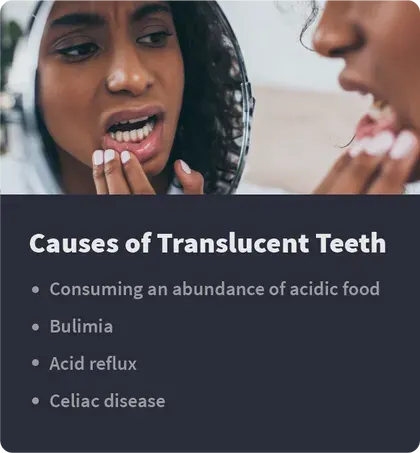Why Are My Teeth Translucent? Causes & Treatment Options

Table of Contents
- Causes
- Treatment Options
- Prevention
- References
When you picture a healthy smile, chances are you envision teeth that are white and opaque. If you look in the mirror and realize your teeth have begun to look more translucent, you may grow alarmed. Translucent teeth are a reason to see the dentist. But such translucence is a common problem, and while it does require dental care, it's not an emergency.

People describe translucent teeth in various ways. Some say their teeth start to look clear, or "see-through," around the edges. Others remark that their teeth appear to be thinning or losing their white outer layer.
Regardless of description, the issue is thinning of the hard, white, outermost layer of your teeth — the enamel. As a result, your teeth lose their opaqueness.
Causes of Translucent Teeth
The issue of translucent teeth doesn’t happen overnight. Instead, your enamel tends to grow increasingly thinner over time. By the time you notice, your enamel has probably been thinning for months or even years.
The most common causes include:
Consuming an abundance of acidic food
Bulimia
Acid reflux
Celiac disease
Exposure to acid can cause your tooth enamel to break down and deteriorate. If you eat a lot of acidic foods, particularly those with a pH less than 5.5, your teeth can grow less opaque over time. Popularly consumed acidic foods include:
Orange and other citrus juices
Tomatoes and tomato sauce
Soda
Vinegar
Coffee, especially light roast coffee
Strangely, brushing your teeth immediately after eating acidic foods accelerates enamel damage. After being exposed to something acidic, your enamel is more porous and soft than usual. Brushing can abrade some of it away.
Dental experts recommend rinsing your mouth with water, then waiting at least 30 minutes – and preferably 60 minutes or more – before brushing.
Enamel erosion is especially present in the teeth of someone suffering from bulimia, an emotional disorder signaled by vomiting up food shortly after consuming it. When you regurgitate, you expel not only the contents of your stomach but also stomach acid.
Constant exposure to stomach acid causes extensive enamel damage and translucent teeth. Dentists can often simply by looking at a patient’s teeth tell whether they have struggled with bulimia.
People who deal with acid reflux or even frequent heartburn may notice their teeth turning translucent. Even small amounts of acid coming up from the stomach when the patient burps can, over time, cause enamel damage.
Damage is most often seen in patients who go undiagnosed for long periods, or in those who do not take their acid reflux medications as prescribed.
Celiac disease is a condition in which the immune system reacts when someone eats food containing gluten. Over time, someone with celiac disease can develop translucent teeth. This is thought to be due to poor absorption of calcium from the diet. A lack of calcium leads to weaker enamel which becomes thin much faster than usual.

Treatments for Translucent Teeth
Having translucent teeth is not merely an issue related to appearances. Thin enamel can make your teeth more sensitive to hot and cold foods. You're also more likely to develop cavities in thin enamel, and those cavities can progress quite quickly. If you have translucent teeth, you need to see a dentist for treatment.
For slightly thin enamel, your dentist may simply recommend fluoride treatments. These treatments expose your teeth to a concentrated fluoride solution, which can help strengthen the enamel that remains. (Your teeth cannot grow new enamel once it is lost, but you can make the existing enamel stronger.)
For more serious cases, your dentist may recommend bonding. A thin, tooth-colored piece of resin will be placed over the part of your tooth where the enamel is thin. This will protect your tooth while also making it look whiter and more opaque.
If the enamel is thin over your entire tooth, your dentist may opt to cover that tooth with a crown. A porcelain crown fits over the tooth like a cap. It will look like a natural tooth while offering top-notch protection from further enamel erosion and decay.
Translucent teeth are at a higher risk for sensitivity, decay, and other damage. If your teeth are starting to look translucent, contact your dentist. They can provide the appropriate treatments and help you develop healthy habits to reduce enamel damage in the future.
Preventing Translucent Teeth
If your teeth are still opaque with strong enamel, here are some tips to help keep them that way:
If you suffer from heartburn on a regular basis, make an appointment with your doctor. You may have acid reflux or GERD. If you are diagnosed, your doctor can prescribe a medication to reduce your episodes of reflux, thereby protecting your teeth from acid exposure.
If you suffer from bulimia, do not delay seeking care. Eating disorder therapy has come a long way and is very effective. The sooner you can stop purging, the lower your risk of enamel damage.
You don't have to avoid acidic foods entirely, but don't make them mainstays in your diet. After you eat something acidic, follow it up by drinking water or eating a non-acidic food item. Drink acidic beverages though a straw to limit direct contact with your teeth.
Fluoride helps strengthen your enamel, making it more resistant to erosion. Make sure the toothpaste you're using contains fluoride. (All toothpastes with the ADA seal do.) Also consider using a mouthwash that contains fluoride for a little extra boost.
If you react poorly to gluten and think you may have celiac disease, see your doctor. A proper diagnosis will help ensure you're following the right dietary protocols to minimize celiac-related damage to your tooth enamel over time.
Sip water throughout the day. It will rinse oral bacteria and their acidic secretions off your teeth, helping to minimize enamel erosion.
